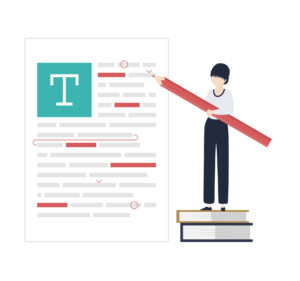I was going over something for a client recently that put me in Annoyed Editor Mode.
The first paragraph did several subject jumps that I found more than a touch confusing. I pointed out the problem, “how did we go from subject A, to subject B, to subject C?” and I made a general suggestion as to how to fix the problem.
I proceeded through the document with only the occasional edit (this client is a good writer), and then I hit the end. The absolute end where the client made a comment that came from absolute nowhere. I again mentioned my confusion with questions that, when answered, would give context to the comment.
How my client replied is what put me in Annoyed Editor Mode. To the first paragraph, nothing happened. The client commented that they added a tie-in at the end. Tell me, how does that help my confusion at the beginning?
For the end, again no change and just a comment. “I was tying the title back in – here at the end.”
OK, fair enough. I admit that by the time I had gotten to the end, I had completely forgotten the title of the article – so the statement wasn’t out of NOWHERE. The problem is that the comment still had no context.
 I sent the article back – with additional comments – and the body of the email said that I was still concerned about what had concerned me at the beginning. My client replied with, I like what I’ve got, go with it. OK, fine. I cannot make you take my suggestions and, since my name’s not on the thing, I went on to the next step.
I sent the article back – with additional comments – and the body of the email said that I was still concerned about what had concerned me at the beginning. My client replied with, I like what I’ve got, go with it. OK, fine. I cannot make you take my suggestions and, since my name’s not on the thing, I went on to the next step.
It turns out, my client had not realized I’d attached a new version of the document with comments that I hoped clarified my concerns. And yet, part of what an editor does is check for consistency. If your editor is asking questions or expressing concern, there is probably something off with what they are reading.
You hired an editor, why would you ignore them?
Why Editing Matters
I have already written on this – as a blog, in my book – and I talk about it REGULARLY. It is sort of a thing with me. Rather than say it all again here (and risk upsetting you and Google), I’ll sum up.
My standard rant on editing has two main points:
- Given time, writers stop seeing what they wrote and start seeing what they intend – at that point, the two rarely match.
- Just because it is obvious to you does not mean it is obvious to everyone.
(These two issues impact editors too. Obviously, my initial comments to my client were not as clear as I thought they were. If they were, I wouldn’t have found myself in Annoyed Editor Mode.)
The additional fact that the brain does not understand or retain as well when reading off a screen than off paper makes editing even more important. People are going to mis-read and mis-understand no matter what. If you are trying to sway a person to your product or service with blogs or email newsletters, your writing needs to be clearer and simpler. (And more frequent, but that’s a different topic.)
Finally, there is the need to provide instant gratification. Let me rephrase that, in a culture that continues to demand instant gratification, you are not going to get far if your writing is confusing. People want answers to their questions NOW. If they do not understand what you are saying they are not going to come back to you. Editors make sure your writing is understandable.
So, yes, editing does matter. If you’ve gone to the effort of hiring an editor, be kind and pay attention to what they are telling you.
– Lorrie Nicoles